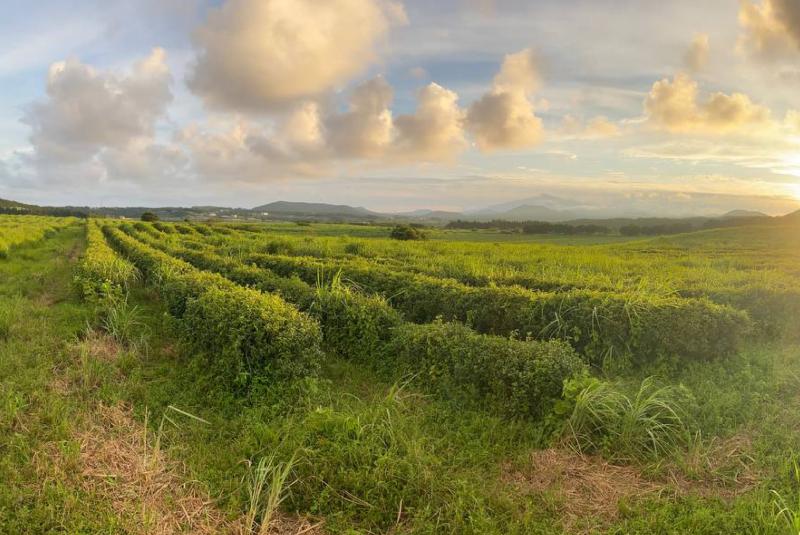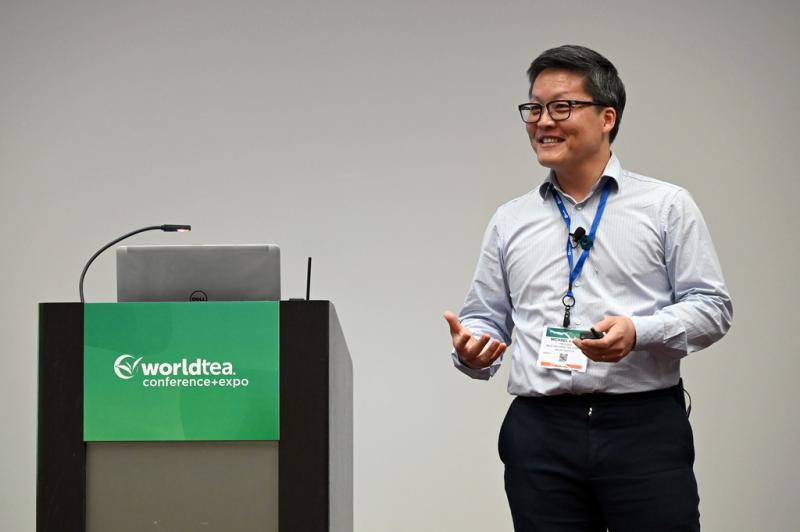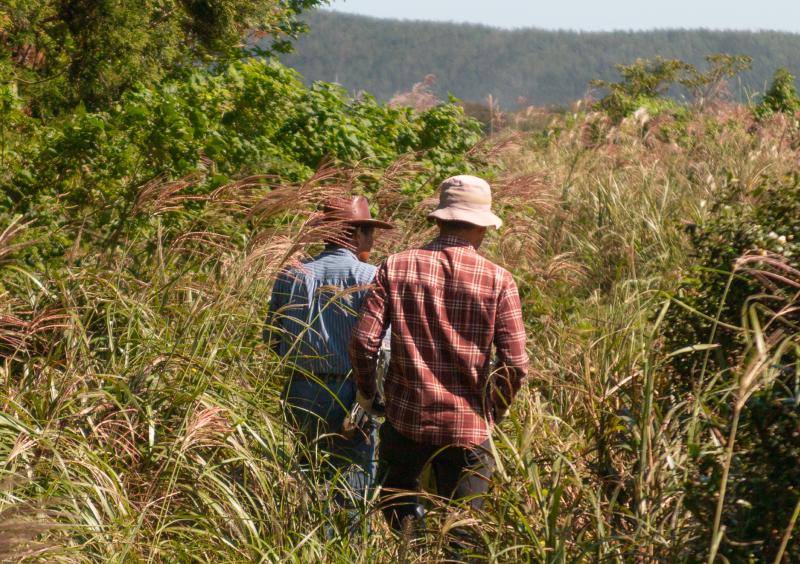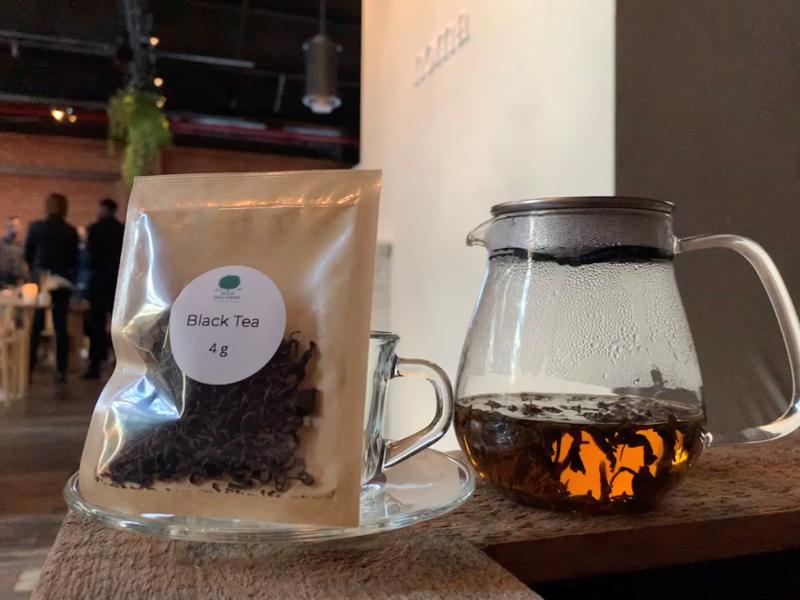Wild Orchard Tea Company – with U.S. operations based in Westchester, New York, and a 1,000-acre partner tea farm in Jeju Island, South Korea – is the first tea brand with a tea farm partner to become Regenerative Organic Certified (ROC). Founded in 2018, the company is focused on bringing the finest, certified organic green teas to consumers.
ROC farms and products meet the highest standards in the world for soil health, animal welfare and farmworker fairness, and the certification program is overseen by the 501(c)3 nonprofit Regenerative Organic Alliance.
“Regenerative organic agriculture is a holistic approach to agriculture that prioritizes soil health and is the cornerstone of our brand because it results in an elevated tea product in both taste and nutrition, while also addressing one of the most pressing issues of our time – climate change,” said Michael Ham, president of Wild Orchard Tea Company, who’s been a featured speaker at the World Tea Conference + Expo. “Obtaining ROC is a fitting recognition for the exceptional work our amazing partner farmers have been doing for more than 20 years.”

Regenerative farming removes potentially harmful contaminants from teas, while restoring soil biology and sequestering carbon into the ground to help curb climate change and restore fragile ecosystems. Ham said he believes ROC is the gold standard of organic farming: “Wild Orchard and our devoted partner farmers strive to be pioneers in regenerative tea, empowering consumers to support farming practices that actively protect personal and planetary health.”
‘A Truly Unique Approach to Farming’
Although Wild Orchard became the world’s first Regenerative Organic Certified tea brand (with a partner tea farm) just this past month, the vision for the farm was crafted decades ago.
“Our farm took a truly unique approach to farming,” shared Ham. “Seeds from gold medal-winning organic tea plants from a sister farm were planted on Jeju Island. Because the tea trees grew from seeds into trees instead of from transplanted bushes, the trees developed deeper root systems that absorb more nutrients. The trees were allowed to grow wild for their first two decades – no pruning allowed. The trees grew tall and amongst other plants and wildlife.”
For the first decade of the tea farm, flocks of geese roamed the fields eating only the sprouting weeds, while naturally fertilizing the already rich soil with their droppings. “This important groundwork performed by the geese allowed our tea plants to build resiliency and benefit from a symbiotic relationship with nature. This is why geese are featured on our brand logo,” said Ham.
Today, the Wild Orchard Tea Company farm is a relatively wild environment. “The trees are watered by rainfall, protected by constant circulating winds that naturally keep harmful pests at bay, enveloped in mild sea mist that provides optimal salinity, grown in nutrient-dense soil from the island’s native volcanic rocks, surrounded by native plants, insects and animals in an ecosystem as untouched as possible,” explained Ham.
By keeping things “wild,” Ham said the farm has been cultivated in line with regenerative agriculture principles for over two decades. A few examples of these principles that are naturally followed by the Wild Orchard Tea Company partner farm include:
Cover Crops – 100 percent of the space surrounding the tea bushes at the Wild Orchard tea farm is covered with native vegetation, which acts as a cover crop. “Cover crops are important as they keep the soil protected and healthy,” Ham said. “When land is bare, it sequesters less carbon from the atmosphere. Cover crops also act as insulation, increase nutrients and microbial activity in the soil, and help avoid soil erosion. Essentially, our teas grow in a wild environment, amidst a plethora of naturally occurring plants and weeds.”
No Tilling – Ham said this is one of the best ways to reduce disturbance to the soil by leaving it covered with native weeds and plants. The healthier the soil is due to lack of soil disturbances – such a tilling – the more carbon is sequestered.
Mulching – The native weeds and cover crops that grow between the tea bushes at the Wild Orchard Tea Company farm are regularly cut and left on the fields to break down and act as natural fertilizer. “This means our partner farm is essentially self-sufficient, reducing the farm’s carbon footprint,” noted Ham.
Agroforestry – More than 10,000 trees are on the Wild Orchard tea farm, not counting tea bushes or other types of bushes. “Having trees and an abundance of other plants grow alongside our teas increases wildlife and pollinator habitat, helps improve soil and water quality, sequester carbon, reduces soil erosion, protects our farm from strong winds, improves resilience and reduces damage from flooding,” shared Ham.
‘A Huge Honor’ to Become Regenerative Organic Certified
Overall, regenerative agriculture is the foundation or essence of Wild Orchard teas, and it’s also how the brand name was conceived, so becoming Regenerative Organic Certified was key for the business.
“It goes without saying that it is a huge honor for us, and we intend to take on this great responsibility by setting a good example for others,” said Ham. “We feel extremely grateful for our colleagues, who work so diligently day in and day out at our partner farm. They’ve been doing this for a long time, so we want to shine a light on their dogged commitment to producing the highest quality teas in the world.”

While there are many challenges to overcome in the tea industry – such as supply chain, social fairness and worker inequality, among others – climate change and sustainability are at the top of the list, according to Ham.
“A regenerative model not only improves farmer welfare that is sorely lacking in our industry, it also allows our earth’s soil biology to be restored and the carbon to be sequestered into the ground, thus helping balance our rapidly changing climate,” Ham said. “A shared vision that sets people and planetary health as foundational pillars will allow us to understand what can effectively address climate change. It’ll inspire us to respect natural habitats and be more mindful about how our individual lifestyle choices impact not only our health and those around us, but can also help re-balance our climate and restore ruined ecosystems.”
Ham said that regenerative agricultural efforts will also result in the tea industry producing higher quality teas, besides benefiting the environment. “Those in the industry must work together to educate consumers, who play a vital role in fostering sustainability throughout the supply chain, to make well-informed decisions not only for their health and enjoyment but also for the natural environment.
Ham noted that the regenerative organic agriculture epitomizes the three “P”s of the triple bottom line – people, planet and profit. “Teas grown in clean, healthy soil reward consumers with greater nutrients and better taste,” Ham explained. “Healthier soil has the ability to act as a carbon sink, helping reverse climate change. Lastly, research conducted by the Rodale Institute has shown that regenerative organic farming is three to six times more profitable than conventional. Regenerative organic agriculture has the power to revive personal and planetary health at scale as more people come to understand its benefits.”
To become Regenerative Organic Certified, Wild Orchard Tea Company and its partner tea farm started the application in the Spring of 2020, after the Regenerative Organic Alliance had concluded their pilot program. Ham said the pandemic posed many challenges, as they could not find a certifying body that was willing and able to perform the farm audit at the time.
The ROC is one of the most aspirational certifications in the world, revealed Ham, so very detailed information on soil health, social fairness and data to estimate carbon emissions were required to get to the audit stage.
“The audit itself was conducted over multiple days on-site and was extremely thorough,” said Ham. “It was like a marathon, so the news that we were the first tea brand to obtain ROC was so thrilling for everyone involved.”
At the time when Ham and his team started the certification process, there was no certifying body in South Korea where their farm is located. This meant none of the documentation and information was available in Korean, so Ham and his team had to be really involved with translating everything and acting as mediator for the partner farm.
“We had to fly in an auditor, but we were very lucky because this led us to work with Dr. Balasubramanian of QCS [the certification auditor that Wild Orchard worked with], who is extremely knowledgeable in all matters relating to soil health and worker fairness.”
Dr. Ramkrishnan Balasubramanian of QCS – Quality Certification Services, who carried out the Regenerative Organic Certification audit, said, "Wild Orchard Organic Teas is the first camellia tea brand to be recognized by the ROC standard... We do anticipate more tea brands that are social and environmentally responsible to include regenerative organic practices into their production system.”
To be ROC, Wild Orchard Tea Company and its partner tea farm had to go through a very rigorous and thorough auditing process with regular checks and soil tests, but Ham encourages other tea farms and companies with tea farms to focus on becoming Regenerative Organic Certified.
“We absolutely recommend everyone join this extremely important movement," said Ham. "By doing so, we will collectively change the world for the better.”

World-famous Restaurant Noma Recognizes Wild Orchard
Wild Orchard Tea Company is already garnering attention for its practices and teas, as it was selected by the world-renowned Copenhagen-based restaurant Noma – a three-star Michelin restaurant and five-time winner of the World’s Best Restaurant Award.
Wild Orchard teas were featured at an exclusive Noma pop-up dinner event that was held recently in New York City.
“I sent some of our teas to a good friend, who works at a top catering firm in NYC last fall,” said Ham, describing how the Noma opportunity came about. “He reached out last month explaining how a super cool and very high-end client focused on organic and sustainable practices might be interested in our teas and asked me to send an overview of Wild Orchard. It got me wondering if this could be a celebrity hosting a dinner party or a famous musician. Two days later, I got a call saying we were selected by the famed Noma to be on the menu at its pop-up, and my heart just filled up with excitement. I’ve been a huge fan of NOMA and Chef René Redzepi since I learned about his journey in Netflix’s Chef’s Table.”
Wild Orchard Tea Company currently offers award-winning, high-quality loose leaf green teas from different harvests throughout the year and in different botanical blends. “We also have a beautiful, delicate black tea and oolong, as well as a very unique matcha black tea that is one of our bestsellers and something to be experienced," said Ham.
The company plans to offer some convenient tea products (non-loose-leaf tea offerings), including tea bags, tea pods for Keurig machines, ready-to-drink bottled teas, tea popsicles, tea candy and even up-cycled tea flakes (which you can add to your favorite cuisine, salad or soup for extra nutrients and an anti-oxidant intake). “We are also developing a skincare line that utilizes a very high-quality green tea seed oil, which does wonders for the skin,” noted Ham.

To learn more about Wild Orchard Tea Company, visit WildOrchard.com. To learn about Regenerative Organic Certification, visit RegenOrganic.org.
Aaron Kiel is an editor, writer and public relations professional in Raleigh, N.C. He’s worked in the beverage, tea and coffee industries for two decades, as well as hospitality and technology. He’s a journalist at heart, but he also wears a PR and communications hat through his consultancy, ak PR Group. He’s a contributing writer/reporter for Questex’s Bar & Restaurant News, and he recently worked as the editor of World Tea News with Questex’s Bar & Restaurant Group. In 2023, he was a finalist and honorable mention in the “Folio: Eddie & Ozzie Awards” for Range of Work by a Single Author – B2B.” Connect with him on Instagram: @adventurer_explorer.
Plan to Attend or Participate in the
World Tea Conference + Expo, March 27-29, 2023
To learn about other key developments, trends, issues, hot topics and products within the global tea community, plan to attend the World Tea Conference + Expo, March 27-29, 2023 in Las Vegas, co-located with Bar & Restaurant Expo. Visit WorldTeaExpo.com.
To book your sponsorship or exhibit space at the World Tea Conference + Expo, or to enquire about advertising and sponsorship opportunities at World Tea News, contact:
Ellainy Karaboitis-Christopoulos
Business Development Manager, Questex
Phone: +1-212-895-8493
Email: [email protected]
Also, be sure to stay connected with the World Tea Conference + Expo on social media for details and insights about the event. Follow us on Twitter, Facebook, Instagram and LinkedIn.
